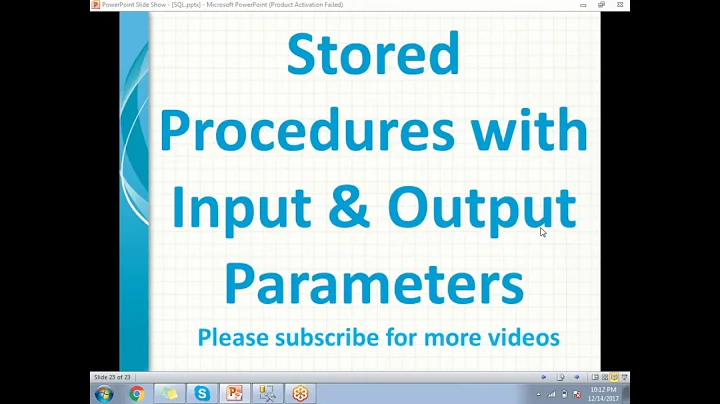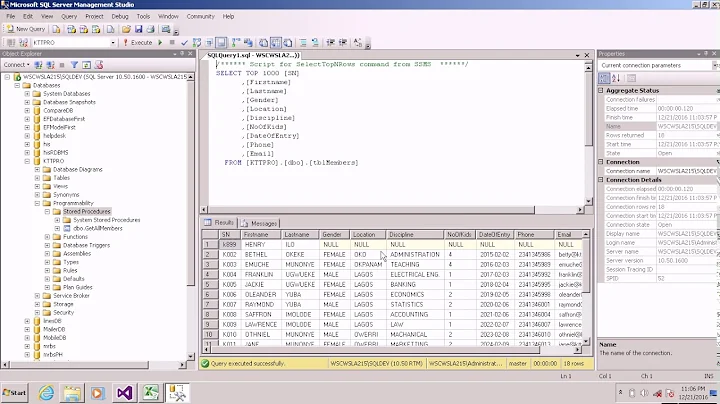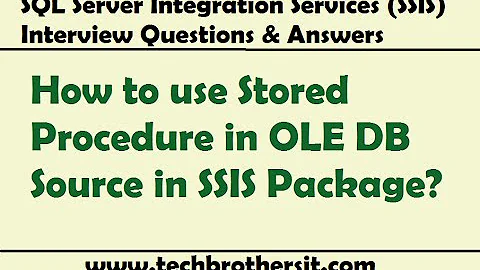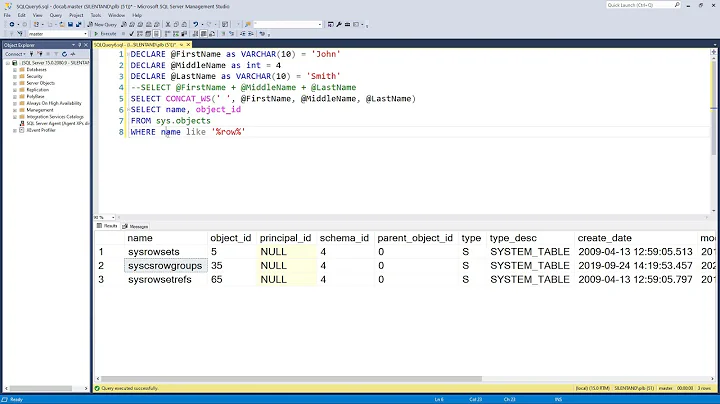T-SQL: Cannot pass concatenated string as argument to stored procedure
Solution 1
The EXECUTE statement simply has a different grammar then other statements like SELECT and SET. For instance, observe the syntax section at the top of the following two pages.
EXECUTE statement: http://msdn.microsoft.com/en-us/library/ms188332.aspx
SET statement: http://msdn.microsoft.com/en-us/library/ms189484.aspx
The syntax for EXECUTE only accepts a value
[[@parameter =] {value | @variable [OUTPUT] | [DEFAULT]]
Whereas the syntax for SET accepts an expression
{@local_variable = expression}
A value is basically just a hard coded constant, but an expression is going to be evaluated. It's like having the varchar 'SELECT 1 + 1'. It's just a varchar value right now. However, you can evaluate the string like this:
EXEC('SELECT 1 + 1')
I suppose all I'm pointing out is that the EXEC command doesn't allow expressions by definition, which you apparently found out already. I don't know what the intention of the developers of T-SQL where when they made it that way. I suppose the grammar would just get out of hand if you where allowed to throw subqueries within subqueries in the parameter list of a stored procedure.
T-SQL Expression: http://msdn.microsoft.com/en-us/library/ms190286.aspx
Solution 2
You cannot do something like this either
exec SomeProc getdate()
you have to put all that stuff in a param like you are doing at your bottom query It might be because it is non deterministic (at least for functions)
Solution 3
It's a limitation on the EXEC statement. See The curse and blessings of dynamic SQL for more information.
Related videos on Youtube
p.campbell
Developer in the Microsoft .NET & SQL Server stack. I am focused on delivering great applications in small iterations. I've developed solutions in marketing, healthcare, manufacturing, and transportation verticals. My open source projects on GitHub. Continuously learning.
Updated on August 13, 2020Comments
-
 p.campbell almost 4 years
p.campbell almost 4 yearsScenario: Need to pass n arguments to a stored procedure. One of the arguments is of type
varchar(x). That varchar argument needs to be constructed from a handful of other varchar variables. This problem uses SQL Server 2005, but this behaviour applies to all versions of SQL Server.Setup:
DECLARE @MyString varchar(500), @MyBar varchar(10), @MyFoo varchar(10) SELECT @MyBar= 'baz ' SELECT @MyFoo= 'bat ' -- try calling this stored procedure! EXEC DoSomeWork @MsgID, 'Hello ' + @MyBar + '" world! "' + @MyFoo + '".'This produces the exception in SQL Server:
Incorrect syntax near '+'. Typically you might think that the datatype would be wrong (i.e. the variables are of different types, but that would produce a different error message).Here's a correct implementation that compiles without error:
SELECT @MyString= 'Hello ' + @MyBar + '" world! "' + @MyFoo + '".'; EXEC DoSomeWork @ID, @MyStringQuestion: Why is it that T-SQL can't handle the concatenation of a varchar as an argument? It knows the types, as they were declared properly as varchar.
-
Buggieboy over 10 yearsThe website referred to in this comment is no longer up.
-
Michel de Ruiter almost 6 yearsMaybe
EXEConly permits string variables because stored procedures can haveOUTparameters for which expressions make no sense. But those don't work with string literals either... -
 Pete Alvin over 4 yearsWhat does this issue have to do with dynamic SQL?
Pete Alvin over 4 yearsWhat does this issue have to do with dynamic SQL?








